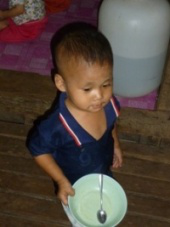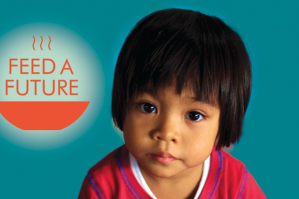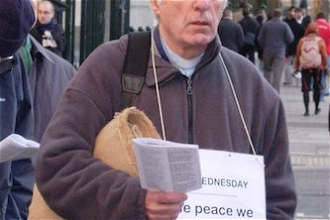Eyewitness report: Visit to the Heavenly Home in Mae Sot, Thailand

Clearing up after dinner
When many of us think of Thailand we imagine palm trees, beautiful beaches, exotic temples and gracious people -but behind the tourist posters there is a great deal of poverty. The country is still recovering from the tsunami and has a growing problem with refugees from Burma, poverty and homelessness. And as always, it is the children who suffer the most. The Thai Children's Trust is one of the main charities working in the region with street children, the disabled, kids with HIV and refugees from Burma. It offers them safe homes, hope, love and a future. Natalia Balaghova visited some of their projects last month. She wrote this reflection on her return.
I will never forget the Heavenly Home. It was the last project I was visiting at Mae Sot, in northeast Thailand on the border with Burma. The house is currently home to 52 children ranging from newborn babies to teenagers. It also offers day care to 12 children. Their very poor parents have to go to work and have no one to look after them. Most of these families have not papers allowing them to access better paid work or education.
It was shortly before 4pm and I already felt emotionally touched from the three other projects I had visited that day. My guide Nobel parked the shaky motorbike we had arrived on - the local fastest, cheapest and fairly efficient way to get from a place to a place. A little boy, no older than two, stood on a wooden box with his arms in the air crying his eyes out.
The place seemed busy with children running around peacefully but no one seemed to pay any attention to him. I looked at Nobel and asked: “Do you think I could comfort him?, her response was something as this: “of course, go ahead, he would probably like that ”. I picked up the little boy and as much he was disturbed he was happy to put his arms around me and with his smaller and less frequent sobs he soon put his head on my shoulder and began to close his eyes. I learnt that he had been crying all day. He rested on me as if he was waiting for me to arrive to do this. I was told that there are so many children here, and so few staff to take care of them, it is just not practical to give the newly abandoned children much attention, as it only prolongs the time it takes for them to adapt.
I was introduced to the environment, children and their daily routine. One of the carers, Khun Peter took a guitar and began playing and singing for the children. Soon everyone joined in. He explained to me that at times it can take up to two weeks for a child to stop crying.
The plan was to show me around the shelter these children live in, find out what they get taught in their basic curriculum with these unofficial teachers or as they say call themselves their older “brothers and sisters”. I was to view their play, interaction time and dinner routine too.
The officials had suggested I put the little one down upstairs on a carpet and a cushion to leave him to rest. As I put him gently down, he immediately began crying. I thought to myself, well we need to wait a little to get him into a deeper sleep first. After about two or three trials I gave up. I told Khun Peter: “Would it be ok to carry him around once you are showing me the place, I do not mind?!”; he smiled and responded: “Of course I don’t mind, once you get tired just let us know.”
Rocking the little boy to sleep, I sat down and watched the children singing and playing. The children were all happy joining in, dancing, singing and willing to touch anyone who gave them any attention. It seemed really a 'heavenly home' so happy and full of life. I found it hard to imagine that these children were left by their parents because they could not afford to keep them. The youngest child who was lying on a bed upstairs was less than two days old. He seemed happy, relaxed and did not cry - just observing his surroundings like a little scientist interested in discovering the life.
After the “cultural session”, it was time for the time for dinner. The older ones helped the younger ones locate themselves squeezing one by one on the wooden stools with benches. Supper was a simple meal of rice and some basic vegetables with some water to drink. Once everyone was ready and all the plates were in front of each little person a little thanking prayer went on, I presume as lost in translation from Thai language, and the eating began. I was amazed to see that the older children took the youngest ones and fed them first, only then they took their own food to eat.
The children had a sense of order and care in them for their surroundings. It was almost as they were brothers and sisters to one other with about only three of four adults to keep the family together. The large aluminium pot was scraped empty.
Once the children finished, they walked towards the two big bowls full of water to put away their plates and spoons, as they were taught to clean up after themselves.
The basic shelter consisted of a simple wooden two storey house with no real doors or windows. Temperatures in Thailand are fairly warm throughout the year but at times it can get cold especially in the winter.
The day finished with an activity to walk outside and brush teeth using a shared barrel full of rain water. I have memories watching these children with their toothbrushes running around outside and getting ready for the bedtime.
I wonder how some of us can have everything and others so little. Perhaps it is because many people do not get a chance to have an experience like this. Our societies had moved apart so widely that it is easier for us to shut the door and not to think about others. Why is it that some people do not have even their own country, not to mention an opportunity to work, study and build their lives? Who decides which human being can and cannot eat and feel safe next to another human being? What future do these children have? Unwanted, abandoned without a country to live safely?
What can we do as individuals to change such behaviour still in 21st century? And do we want to get involved? Let reach out and try that is the only thing we can really do, there are no guarantees in life but if we don’t try we will never make the world a better place.
For more information or if you would like to sponsor a child see: www.thaichildrenstrust.org.uk/help



















